Letter from James Buchanan to A. T. Goodman

Former President James Buchanan responds to A. T. Goodman's question about his remarks and how he voted as a Senator on the Tariff Bill of 1842.


Former President James Buchanan responds to A. T. Goodman's question about his remarks and how he voted as a Senator on the Tariff Bill of 1842.

Two letters from former President James Buchanan to Jessie Magaw regarding his health, Jessie's education, and news regarding their extended family. "Your Cousin Harriet [Lane] was married to Henry E.
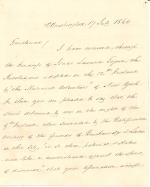
President James Buchanan writes to John T. Henry and several other men regarding a meeting of “the National Volunteers” of New York, sectional tensions, and the Presidential Election of 1860.

Former President James Buchanan writes publisher James Gordon Bennett several days after leaving the White House and asks that the New York Herald be sent to him in Lancaster, Pennsylvania.
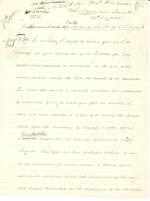
Former President James Buchanan writes to Horace Greeley, editor of the New York Tribune, and declines to send “any explanation, comment or disclaimer' of the acts of my administration during the last six months of its existence." While h

Former President James Buchanan writes to Dickinson College President Herman Johnson Merrills with information on several alumni, including William Speer (Class of 1788), Jesse Magaw (Class of 1806), and Buchanan's brother George Buchanan (Class o

Former President James Buchanan discusses his administration's policies, his health, and other personal matters in a letter to Reverend Henry Slicer.

Former President James Buchanan writes to Charles N. Pine and explains why he will not contact President Abraham Lincoln on Pine's behalf.

Former President James Buchanan explains to Thomas A. Goodman that he will not provide the autograph of another individual.
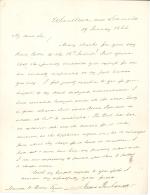
Former President James Buchanan thanks Marvin H. Boves for support of "my much much maligned administration." Buchanan also mentions his new book, Mr. Buchanan's Administration on the Eve of the Rebellion.

Former President James Buchanan writes to a group of Democrats who live around Harrisburg, Pennsylvania, and explains his inability to attend their independence day celebration.

Former President James Buchanan writes Joseph B. Baker to criticize Kentucky Senator Garrett Davis' resolution. "It is infamous as well as false," as Buchanan explains. Transcript included.

The Dickinson College catalog for the 1861-1862 academic year. Through the years, the annual catalog was variously titled "The Bulletin," "Catalogue and Register," "Course Catalog," and similar variants.

The Dickinson College catalog for the 1863-1864 academic year. Through the years, the annual catalog was variously titled "The Bulletin," "Catalogue and Register," "Course Catalog," and similar variants.

The Dickinson College catalog for the 1864-1865 academic year. Through the years, the annual catalog was variously titled "The Bulletin," "Catalogue and Register," "Course Catalog," and similar variants.

The Dickinson College catalog for the 1865-1866 academic year. Through the years, the annual catalog was variously titled "The Bulletin," "Catalogue and Register," "Course Catalog," and similar variants.

The Dickinson College catalog for the 1874-1875 academic year. Through the years, the annual catalog was variously titled "The Bulletin," "Catalogue and Register," "Course Catalog," and similar variants.

Raphael Benham prepared this oration, entitled "Dante," for the Union Philosophical Society's Sophomore Contest held May 24, 1878. Transcript included.

Natural Science Professor Charles F. Himes (Class of 1855) describes his experience in photographing the solar eclipse in Ottumwa, Iowa on August 7, 1869 .
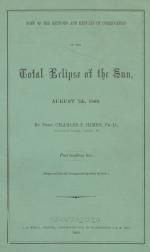
Natural Science Professor Charles F. Himes (Class of 1855) describes his experience in photographing the solar eclipse in Ottumwa, Iowa on August 7, 1869 for the Evangelical Quarterly Review.
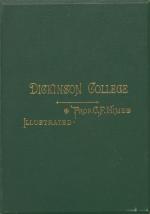
Publisher: Harrisburg: Lane's Hart

Charles Collins records his thoughts and activities during his latter years as president of Dickinson College in Carlisle, Pennsylvania, and then as the head of State Female College in Memphis, Tennessee.
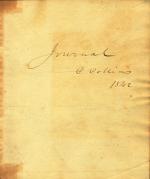
Charles Collins records his thoughts and activities from his time at Emory and Henry College in Emory, Virginia, to his years as president of Dickinson College in Carlisle, Pennsylvania, and then as the head of State Female College in Memphis, Ten

Horatio Collins King details his life in post-war New York City society, including his work as a lawyer, his second marriage to Esther A. Howard and honeymoon at Niagara Falls, and a trip to Nebraska aboard the new Union Pacific railroad.

Horatio Collins King, serving as the divisional quartermaster under General Philip Sheridan, describes cavalry activities in the Shenandoah Valley during the final months of the Civil War.